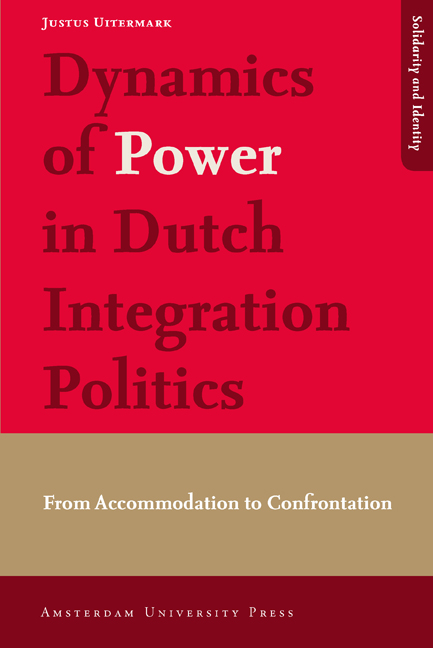2 - The Struggle for Civil Power
Published online by Cambridge University Press: 15 January 2021
Summary
This chapter's purpose is to develop conceptual lenses that allow us to ask empirical questions about the dynamics of power in integration politics. The chapter begins with a discussion of Jeffrey Alexander's work on the civil sphere and how it can be used to study integration politics. It then posits Bourdieu's field analysis as a fruitful avenue for examining power relations in the civil sphere. I subsequently argue that discourse analysis and network analysis can increase the explanatory leverage of field analysis. The result is an approach that provides a relational understanding of civil power, enabling us to examine transformations of power relations in a variety of different settings. Towards the end of the chapter, I argue that other approaches to the study of integration politics – while providing insight into power relations – do not sufficiently account for its dynamism. Finally, I indicate how this study's research question will be answered.
Integration: A national fascination
After it became clear that labor and post-colonial immigrants were here to stay, Western European countries developed comprehensive institutional practices and discursive frameworks to determine if and how these outsiders would be recognized as citizens. The response to the presence of immigrants reflected each country's conceptions of nationhood and citizenship. In the United Kingdom, immigrants were classified mainly in terms of “race”. In France, they were labeled as “citizens” in the tradition of the Republic. Immigrants in Germany were excluded from citizenship as a result of the ethnic understanding institutionalized in its citizenship regime, while in the Netherlands ethnic diversity was accommodated according to the indigenous logic of “pillarization” (Brubaker 1992; Favell 2001; Joppke 1996; Koopmans et al. 2005).
While national idiosyncrasies endure, there seems to be a convergence in citizenship regimes across Western Europe. Most national governments now explicitly aim to reduce the immigration of low-skilled (family) migrants and have developed comprehensive programs to turn those who do immigrate into self-sufficient and autonomous citizens (Joppke 2007). The desired outcome is individual and societal integration (Favell 2003). Joppke is quite right when he suggests that talk of ‘national models’ sounds oldfashioned (Joppke 2004: 452). Left- and right-leaning parties now also seem to agree on the basic ingredients of successful integration policy: the immigration of poor migrants must be curtailed, discrimination should be combated, and a set of incentives and disincentives put in place to induce immigrants to become economically productive and culturally assimilated citizens (Joppke 2007).
- Type
- Chapter
- Information
- Dynamics of Power in Dutch Integration PoliticsFrom Accommodation to Confrontation, pp. 21 - 44Publisher: Amsterdam University PressPrint publication year: 2013



